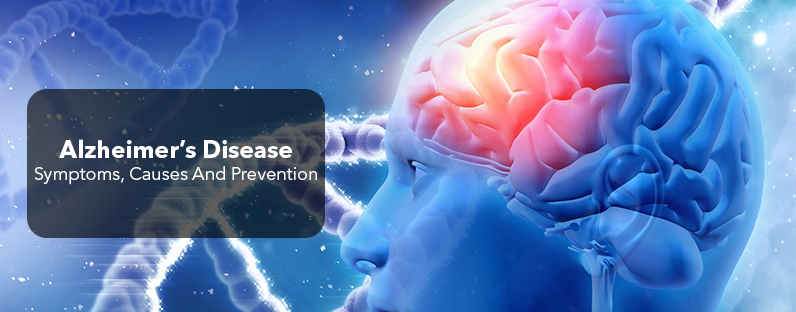Alzheimer’s Disease- Symptoms, Causes and Prevention
Alzheimer’s disease is a progressive disorder which causes the cells of the brain to waste away and die. Alzheimer’s disease is the most usual cause of dementia — a gradual deterioration in cognitive, behavioral, and social abilities that interferes with a person’s ability to work independently.
The disease’s early symptoms may be to forget recent events or conversations. An individual with Alzheimer’s disease will experience significant memory loss as the disease progresses, and may lose the ability to perform daily tasks.
Medications for Alzheimer’s disease can temporarily improve symptoms or slow down the rate of decay. Often, these medications can help people with Alzheimer’s disease improve function and preserve independence for a while. Various programs and services will support people with Alzheimer’s disease and their cares.
Symptoms Alzheimer’s Disease
To obtain an Alzheimer’s diagnosis, the person must have undergone a deterioration in cognitive or behavioural function and performance to compare with how they were before. This deterioration has to conflict with their ability to operate at work or in daily activities.
The cognitive decline must be seen in at least two of the four symptom areas listed below:
1. Reduced ability to take in and remember new information, which can lead, for instance, to:
- Repetitive questions or conversations
- Misplacing personal belongings
- Forgetting events or appointments
- Getting lost on a familiar route
2. Impairments to reasoning, complex tasking, and exercising judgment, for instance:
- Poor understanding of safety risks
- Inability to manage finances
- Poor decision-making ability
- Inability to plan complex or sequential activities
3. Impaired speaking, reading and writing, for instance:
- Difficulty in thinking of normal words when speaking, hesitations
- Speech, spelling, and writing errors
4. Changes in personality and behavior, for instance:
- Loss of empathy
- Compulsive, obsessive, or socially unacceptable behavior
If the number and frequency of symptoms confirm dementia, then Alzheimer’s can be confirmed by the following factors.
- A slow start, over months to years, not hours or days
- A marked deterioration of the normal level of cognition of individuals in particular areas
If symptoms start or escalate over hours or days you should seek urgent medical treatment as this can suggest an acute disease.
Alzheimer’s is most likely when memory loss is a prominent symptom, especially in the field of learning and new knowledge being remembered.
Language issues can also be a key early symptom, including struggling to find the right words.
The most famous prominent deficits in executive dysfunction may have to do with reasoning, judgment and problem-solving.
When to see a doctor
A variety of conditions, including treatable conditions, may lead to memory loss or other symptoms of dementia. If you are worried about your memory or other cognitive skills, speak to your doctor for a detailed diagnosis and evaluation.
If you are concerned about thought skills you notice in a family member or relative, chat about your questions and ask to go to a doctor’s appointment together.
Causes
Scientists believe Alzheimer’s disease is triggered for most people by a combination of genetic, lifestyle, and environmental factors that change the brain over time.
Alzheimer’s is caused less than 1 per cent of the time by specific genetic changes that virtually guarantee that a person will develop the disease. Such unusual events typically lead to the onset of disease in middle age.
The proper causes of Alzheimer’s disease are not fully understood, but at its core are problems with brain proteins that fail to function normally, disrupt the work of brain cells (neurons) and unleash a series of toxic events. Neurons suffer injury, lose connections and eventually die.
The damage most often starts in the brain which controls memory but the process starts years before the first symptoms. The loss of neurons spreads to other regions of the brains in a somewhat predictable pattern. The brain has significantly shrunk by the late stage of the disease.
The researchers concentrate on two protein roles:
Plaques: Beta-amyloid is a part of a bigger protein leftover. As these fragments bind together, they tend to have a toxic effect on the neurons and disrupt contact between cells. Such clusters form larger deposits called amyloid plaques and other cellular debris as well.
Tangles: Tau proteins play a part in a neuron’s internal support and transport system to carry nutrients and other essential materials. Tau proteins change shape in Alzheimer’s disease and organize into structures called neurofibrillary tangles.
Complications
Loss of memory and vocabulary, impaired judgment and other cognitive changes induced by Alzheimer’s can take care of other health problems more complicated. An individual with Alzheimer’s disease may not be able to:
- Communicate that he or she suffers from a dental problem, for instance, a dental problem
- Report symptoms of another illness
- Follow a prescribed treatment plan
- Notice or describe medication side effects
When Alzheimer’s disease goes to its final stages, changes in the brain begin to affect physical functions such as chewing, balance and control of the bowel and bladder. These effects will increase susceptibility to more health issues such as:
- Pneumonia and other infections
- Falls
- Fractures
- Bedsores
- Malnutrition or dehydration
Prevention
Alzheimer’s disease is not a preventable condition. Many risk factors for Alzheimer’s lifestyle, though, maybe modified. Data indicates that diet, exercise and habits changes — measures to reduce the risk of cardiovascular disease — may also reduce the risk of developing Alzheimer’s disease and other dementia-causing disorders. Heart-healthy lifestyle choices which can reduce Alzheimer’s risk include:
- Exercise regularly
- Consume a diet of organic produce, balanced oils and low-fat foods
- Follow the recommendations for treating high blood pressure, diabetes and high cholesterol
- If you smoke, ask your doctor for help to quit smoking
